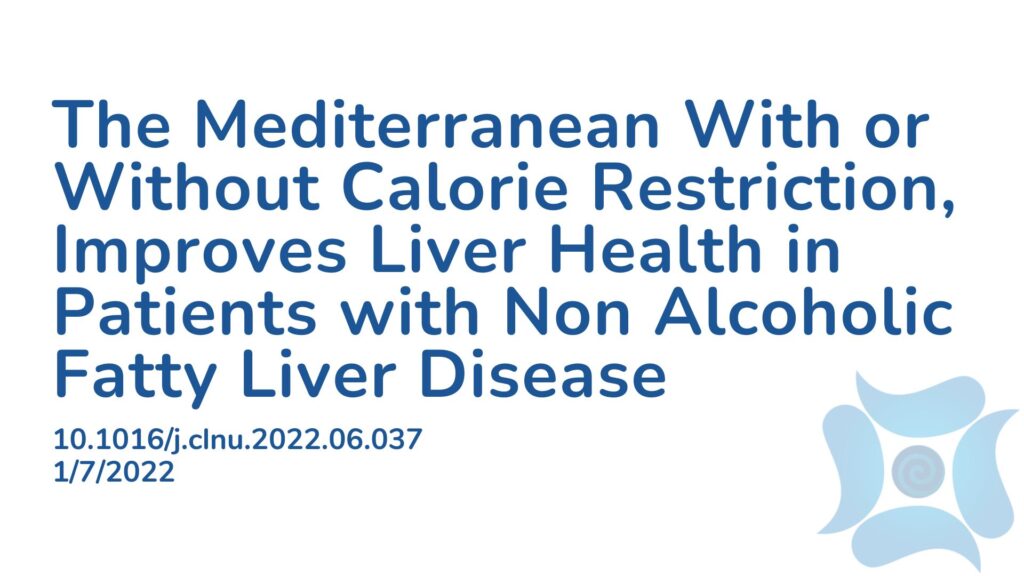Summary: Non-alcoholic fatty liver disease (NAFLD) impacts a quarter of the population worldwide and there are currently no approved pharmacological medications. As a result, lifestyle and dietary interventions that facilitate calorie restriction to induce weight loss have been recommended. There is also evidence that adherence to the Mediterranean Diet (MD) is important in protecting the liver from disease progression and that calorie restriction alone may not be enough. The authors of this systematic review synthesised the findings from twenty six studies investigating the effects of the MD with calorie restriction, in relation to liver function and weight loss. Among the reviewed trials, calorie restriction showed improvement in liver function. There was also consistent evidence that the MD improved outcome measures of NAFLD, with or without calorie restriction. However, the studies included on the MD were short to medium in length meaning they were not tracing patients for long enough to verify this evidence as clinically appropriate. Larger and longer-term studies are needed in order to inform clinical practise.
Abstract:
Background & aims: Lifestyle interventions that focus on reduced energy intake and improved dietary pattern are the mainstay of non-alcoholic fatty liver disease (NAFLD) management. However, it remains unclear which dietary approaches are most beneficial and promote greatest adherence. We aimed to synthesise data from randomised and clinical controlled trials, describing the effects of Mediterranean Diet and Calorie Restriction interventions on NAFLD surrogate markers, in adults. Methods: We searched MEDLINE, Embase, Scopus, Web of Science, and Cochrane Central Register of Controlled Trials (October 2021). Study quality was assessed using the Cochrane Collaboration’s tools: risk of bias for randomised controlled trials, and risk of bias in non-randomised studies of interventions. Meta-analyses were performed using a random effects model, and the I2 statistic was used to assess heterogeneity. Results: Of 4041 records identified, 26 articles with 3037 participants met the inclusion criteria, including studies on calorie-restricted interventions (CRI) (n 9), Mediterranean diet (MD) interventions (n 13) and MD component interventions (n 4). Studies were heterogeneous regarding intervention components, assessment of liver status and diet outcomes. 3 studies reported zero attrition and mean attrition rate for the remaining 23 studies was 14%. Post-intervention meta-analyses revealed that dietary interventions reduced alanine aminotransferase (ALT) (P < 0.001), aspartate aminotransferase (AST) (P = 0.004), Fatty Liver Index (FLI) (P < 0.001), hepatic steatosis (HS) (P = 0.02), and liver stiffness (P = 0.01). CRI had favourable effects on ALT (P < 0.001), HS (P < 0.001) and liver stiffness (P = 0.009). MD reduced ALT (P = 0.02), FLI (P < 0.001) and liver stiffness (P = 0.05). There was a dose–response relationship between degree of calorie restriction and beneficial effects on liver function and weight loss, suggesting that this approach should remain the cornerstone of NAFLD management. In addition, diet composition changes have potential for improving NAFLD and the limited data suggest that MD may be an effective diet therapy. Conclusion: These results support the current guidelines in NAFLD. However, further studies, which robustly evaluate the effects of interventions on dietary intake, acceptability and sustainability of the interventions, and quality of life and other patient-related outcomes are needed to support effective care delivery.
Article Publication Date: 1/7/2022
DOI: 10.1016/j.clnu.2022.06.037




